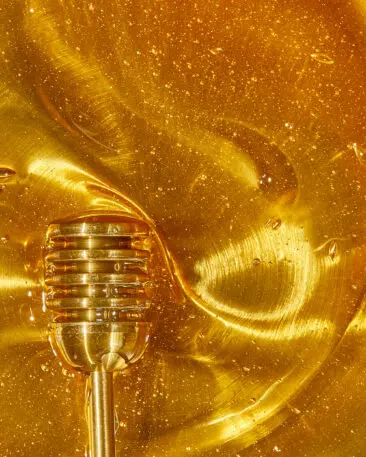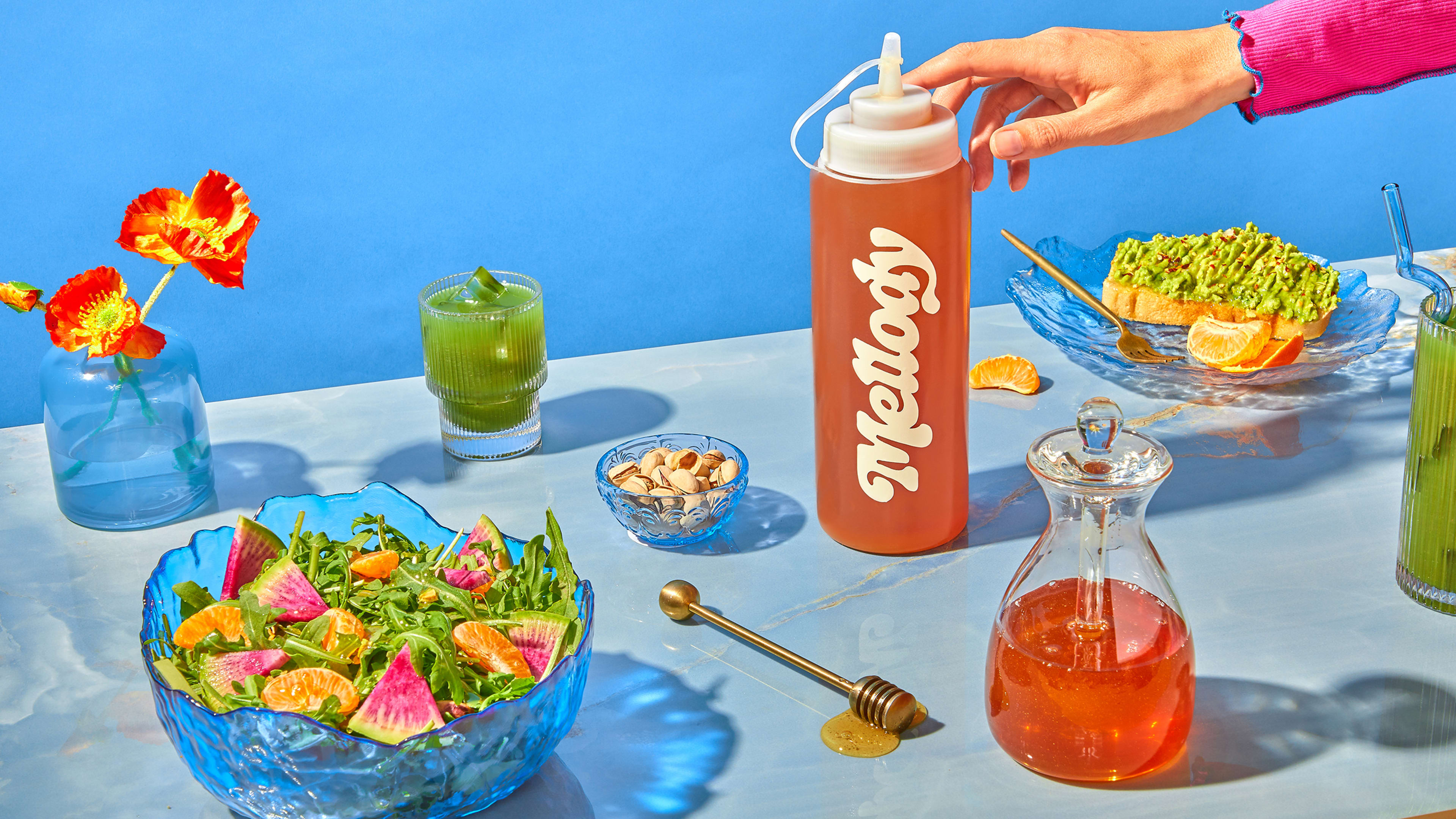When you first get a jar of Mellody vegan honey, your instinct is to try it in all the typical ways one would eat honey: swirled over a bowl of Greek yogurt, mixed in green and mint teas, spread on a slice of toast, and, late one night while working on this article, right out of the jar. The product—made by San Francisco’s MeliBio and sold for $45 exclusively through Eleven Madison Home, the packaged goods offshoot of the three Michelin-starred restaurant Eleven Madison Park—arrives in a cloth bag with a small wooden honey dipper. Unwrapping it, the first thing you notice is the color: a dark golden brown. Promising. The honey itself is sweet with a subtle floral aftertaste, and it didn’t overpower other flavors. I’m no honey sommelier, but if you gave me a blind taste test, I’d say this was the real thing.
That’s a remarkable feat. There’s a reason people use the word “fake” to describe the products seeking to replace a beloved food with a more sustainable or humane alternative. Whether it’s hamburger “meat” made from pea protein, jackfruit cooked to look like pulled pork, “chicken” nuggets molded out of soy, or “shrimp” fashioned from seaweed protein, they all have to pull off a particular magic trick: They have to match the texture, smell, and “mouthfeel” of the food they’re designed to supplant (often while also having to be healthier). It’s a bar that’s only gotten higher as consumers have shown that they’re willing to try these substitutes but won’t stick with them if they can’t deliver.
Sugar substitutes have been at this game a lot longer than the alternative proteins have. They often fail miserably in terms of having a strong aftertaste, delivering a sickening sweetness, and offering no health benefits. Syrups meant to replace honey also suffer from these problems, even if they’re naturally derived. Agave, brown rice syrup, maple syrup, sugarcane juice: They don’t taste bad, but they don’t taste like honey.
The reason that Mellody tastes so . . . realistic is simple, according to cofounder and CEO Darko Mandich. The company uses plants that produce pollen that bees consume, and then combines them with fructose and glucose syrup to create a honey with all of the same ingredients found in nature. “Through our proprietary technology, we’re basically almost matching honey on the molecular [level],” says Mandich, a Serbian native who spent his career in the $9 billion honey business before moving to California in 2019 with the specific goal of making vegan honey. “I wanted to start a honey company for a sustainable future.”

The case for an alternative honey
Although the industrial honey-making process doesn’t actually kill bees for the most part, Mandich argues that industrial honey negatively affects bee biodiversity because honeybees push out other types of wild and native bees. Bees pollinate roughly 80% of flowering plants, but honey bees only pollinate a small fraction of them; wild and native bees are needed to pollinate the rest and maintain a balanced ecosystem. The destruction of native bee populations impacts the types of plants that get pollinated, and also the animals that feed or otherwise rely on on those plants.
“A big problem we have is that wild and native bees are dying because of the competition between native bees and managed honey bees,” Mandich says, adding that because managed bees are often raised in a closed environment, they can introduce dangerous pathogens to native bee populations. “By creating honey without bees, we directly remove the pressure that comes from introducing more honey bees into nature. This lets wild and native bees thrive,” Mandich says. Beyond possibly preventing more honey bees from being introduced into the ecosystem, it’s unclear how a company like MeliBio could help save endangered wild and native bees, which also face significant challenges from climate change and the use of pesticides.
At least when you get Mellody, you know what you’re buying. Honey is one of the most faked food substances in the world, along with olive oil and milk, according to compliance management company Decernis. The condiment can easily be diluted or even chemically modified to fool regulators. To ensure quality control at their production facility in California, MeliBio employs taste testers and works with honey sommeliers.

A fateful $300,000 dinner
Mandich and his cofounder Aaron Schaller knew that having the imprimatur of chefs for their vegan honey would benefit their nascent startup in a number of ways. If their vegan honey was good enough for a world-class restaurant, then it would be good enough for everyone. It would introduce their product to elite foodies who’d then seek it out when it became available. The industry itself would take notice that a new ingredient had entered the scene. And this strategy has been proven to work, most notably with Impossible Foods introducing its products via high-end expressions of it in trendy restaurants.
So, this time last year, Mandich and Schaller booked a reservation at New York’s Eleven Madison Park, which had made its menu fully vegan in 2021. They packed a prototype of what would become Mellody—which cost $300,000 to make—to take on their journey, convinced that they’d be able to persuade the chefs to try it. Eleven Madison Park is renowned for its unreasonable hospitality and playful interactions with diners, so it wasn’t as big a risk as it might be at a stuffier Michelin three-star restaurant. The two nervously offered some honey to the waiters and asked if they could also show it to the chefs working that night. They liked it, which ultimately led to Eleven Madison Home being the first outlet to sell Mellody, first as part of a $150 Mother’s Day-themed tea box and now individually.
Mellody does cost about twice the price (or more) of honey that can be purchased at a farmer’s market. Mandich says that it will eventually retail for cheaper as the company scales up. That’s what he raised $9.4 million in venture capital to do. “We’re in expansion mode, and we wanted capital to be able to refine our technology and to produce more so that it can be sold in more places,” Mandich says, adding that Mellody’s eco-friendly credentials and identical taste to real honey will appeal to more than just committed vegans.
That strategy recalls venture-backed luxury strawberry retailer Oishii’s decision to lower the price of its strawberries from $60 to $15 as it opened a larger production facility and started selling at Whole Foods. “At some point in the next few years, we’re going to be matching what people pay for regular honey,” Mandich says, adding that he hopes to eventually be in most grocery stores, competing with regular honey on the shelves in price and taste.
The startup has seen success with other restaurants, including The Butcher’s Daughter, a micro-chain of plant-based cafes known for serving kelp burgers, cauliflower pizza, and jackfruit “crab” cakes. But Mandich says that this is just the start. “We’re starting with food service first, but very soon we’re looking to expand into more restaurants and cafeterias at places like universities,” he says, adding, “At some point we’ll be looking into other channels. We want to make sure that people can consume Mellody as a standalone product and partner with companies that use honey in formulating their bars, granola, and other savory and sweet products and beverages.”
If Mandich has his way then, you may soon be consuming vegan honey without even knowing it.
Recognize your brand’s excellence by applying to this year’s Brands That Matter Awards before the early-rate deadline, May 3.
